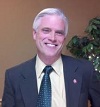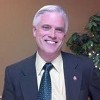
PART 1: Lee Martin’s life impacted by last conversation with his father
 (EDITOR’S NOTE: This is the first of two articles from an interview with Lee Martin, one of the entrepreneurial leaders and champions in the East Tennessee region.)
(EDITOR’S NOTE: This is the first of two articles from an interview with Lee Martin, one of the entrepreneurial leaders and champions in the East Tennessee region.)
The last conversation that local entrepreneurial icon Lee Martin had with his father more than a quarter of a century ago provided the critical insight to decide which of three career paths he would ultimately take. Most know the choice that Martin made, but the process of making his decision is reflective of the individual, his values and the people who have impacted him.
In a recent interview with teknovation.biz, Martin recalled the conversation with his father as vividly as if it had happened a week before. The date was March 17, 1986, and Martin was visiting the hospital where his father was struggling with the effects of emphysema. It would be the last time that he saw him before he died less than a week later.
“I took a copy of my dissertation and placed it on his bed,” Martin recalled. “I had a chance to ask those questions that you always wanted to ask your parents but never had.”
Martin explained that his father had never graduated from college, electing in 1932 to quit the University of Tennessee and accept a position with the Tennessee Valley Authority.
“He was very dedicated to TVA and had a good career, retiring as Electric Power Distribution Superintendent in Middle Tennessee,” Martin explained. In that role, Martin’s father was regularly called away from home when electric service was disrupted.
In that hospital room, Martin asked his dad, “What was it that made you work so hard?” The response was simply “I wanted to provide well for your mom and you boys.” Lee Martin accepted the answer, but thought there was more, so he asked his father. “What else was driving you?” The response is the one that seems to have guided Lee since then.
His father suggested that his son stop on a hill on U.S. Highway 231 about three miles south of Lebanon and just look. “It will come to you,” Martin recalls his father saying. As he probed and his father answered, the “it” became apparent as the elder Martin told his son to watch the lights begin to come on across the landscape as dusk turned to night.
“Because of my efforts and the efforts of my team, we will touch the lives of thousands of people that we will never meet,” Martin’s father told him. “This man of few words was really saying that a life worth living is a life worth living for others.”
Martin’s father died four days after the conversation, but the advice about making a difference with your life clearly had a significant impact on the soon-to-be doctoral graduate who was trying to decide between careers as a researcher, teacher or entrepreneur.
Martin was also fortunate during this period of his life to be able to call Charlie Weaver, the first Chancellor of UT’s Knoxville campus, as a mentor. At this stage in his career, Weaver was a consultant to Oak Ridge National Laboratory (ORNL) where Martin was working as a researcher while completing his dissertation.
The always affable and plain spoken Weaver responded to Martin’s request for guidance on which career path to take with a response similar to the one that Martin’s father had offered. “I can’t tell you what to do, but I can tell you how to figure it out,” Weaver told Martin.
In an approach that one might expect an engineer to suggest, Weaver told Martin to draw a graph with the vertical axis being what is important to you and the horizontal axis being each of the next five years. Martin was to take the three career opportunities and determine the best and worst that each could be after five years.
Martin’s evaluation of staying at ORNL was “it was the comfortable” option, but “the great work would stay behind the fence.” More important, he had adopted his father’s passion for touching people’s lives.
In the case of teaching, Martin thought that it would require a decrease initially in compensation, but that would most likely get addressed over time. Yet, there was always the issue of tenure after seven years. If he was not successful, Martin would have to start over.
The third option was to start a company, something that seemed entirely possible since Martin already had won two Small Business Innovation Awards and would have immediate cash flow to buy food and pay the bills.
“The top line for a start-up in five years dwarfed the other career options,” Martin concluded, particularly when he decided the worst case scenario was failure which would cause him to revert to one of the other two options.
“I struggled with it for three days,” he said, but he made the decision with obvious influence from the words of his father and the decision process that his mentor offered.
In July 1986, TeleRobotics was formed.
NEXT: From a start-up entrepreneur to a champion of entrepreneurship at UT and everything in between.
Like what you've read?
Forward to a friend!

